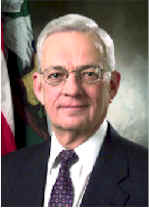Paul O'Neill
Paul O'Neill served as Secretary of the Treasury in the Bush Administration until forced to resign in December, 2002.
O'Neill left "office with a track record that disappoints his many admirers in Corporate America, his detractors on the Republican Right, and his many critics in the Democratic Party. While George W. Bush has been the Teflon President, with none of the criticisms of his Administration sticking to him, complaints about White House economic policy stuck to O'Neill like Velcro."[1]
O'Neill was asked to leave by the White House, according to Bush Administration sources.[2] He was replaced as Treasury Secretary by John Snow by President George W. Bush on December 6, 2002.
According to the December 17, 2002 Christian Science Monitor,
- "Before he was forced to resign, former Treasury Secretary Paul O'Neill broke the code that limits criticism to inside the White House only. He publicly voiced doubts about broad tax cuts and warned about looming deficits. Top economic adviser Larry Lindsey strayed when he told a newspaper that an Iraq war could cost $200 billion. These were not the main reasons for their ousters, but the White House certainly was displeased with their comments."
In a Foreign Policy In Focus article on the Bush administration cabinet members, Paul O'Neill was described as
- "a curious choice for treasury secretary." Coming "from an industrial company, not Wall Street, [O'Neill] received some praise from labor leaders. His views are hard to categorize: the New York Times calls him the 'wildcard' in the Bush cabinet. He might better be described as a capitalist with a long-term outlook of what ensures profits."
The December 2000 issue of Tax-News.com described O'Neill as
- "an unconventional man, who has occasionally taken positions on global warming, energy taxes, education, Social Security and health care that seemed neither partisan nor Republican." It also reported that, in 1990, O'Neill "tried publicly to persuade President George H. W. Bush to put a $10 per barrel tax on the price of oil as a way of reducing energy use, protecting the environment, and helping close the budget deficit."
In 1987, O'Neill was lured to Alcoa, by Alan Greenspan, a member of the Alcoa board of directors, who had met O'Neill when they both worked in the Gerald R. Ford administration. When Bush tapped O'Neill for Treasury, Greenspan praised Bush for attracting 'an exceptional and talented person.'"
Contents
Background
Career Highlights
- Alcoa corporation, 1987-2001, President
- International Paper corporation, 1977-1987, President (1985-1987)
- Office of Management and Budget, 1967-1977, Deputy Director (1974-1977)
- U.S. Veterans Administration, 1961-1966.
Education
- Bachelors of Arts, Fresno State College. Major in Economics.
- Master of Public Administration, Indiana University.
Affiliations
- Trustee, American Enterprise Institute
- Trustee, Council for Excellence in Government
- Member, Policy Committee, Business Roundtable
- Board of directors, the Business Council
- Board of directors, the Conference Board
- Trustee, RAND Corporation [3]
Other Related SourceWatch Resources
- Bush administration
- Bush administration investigations
- Bush administration scandals
- Bush administration smear campaigns
- Intimigate
- Lawrence Lindsey
- weapons of mass deception
Books about Paul O'Neill
- Ron Suskind, "The Price of Loyalty". Simon and Schuster, 2004. (ISBN 0743255453)
External links
- Michael Wallace, Bush's Shuffle: What's in the Cards, BusinessWeek, December 6, 2003.
- Richard S. Dunham and Rich Miller, Nice Guys Finish Last. Ask Paul O'Neill., BusinessWeek, December 10, 2002.
- Martin Crutsinger, O'Neill Calls Bush a Disengaged President, AP, January 9, 2004: "Former Treasury Secretary Paul O'Neill, pushed out of the administration for not being a team player, says President Bush was so disengaged during Cabinet meetings that he was like a 'blind man in a roomful of deaf people.'"
- Bush 'Outed' on Iraq, Toronto Star Editorial, January 13, 2004.
- The Awful Truth by Paul Krugman, New York Times, January 13, 2004.
- More Evidence of Mass Deception by James O. Goldsborough, San Diego Union-Tribune.
- A Rebel Republican by Sidney Blumenthal, Guardian/UK, January 15, 2004.
- Robert B. Reich, O'Neill Has Done His Country a Favor, Newsday, January 16, 2004.
- Trust O'Neill, Not His Critics , Madison Capital Times Editorial, January 16, 2004.
- Jason Leopold, O'Neill's Claims Against Bush Supported By 1998 'War' Letters to Clinton Signed By Rumsfeld, Wolfowitz, liberalslant.com, January 19, 2004.
- Susanne Malveaux, O'Neill cleared in use of classified documents. Probe faults Treasury Department for releasing secret papers, CNN, February 6, 2004.
